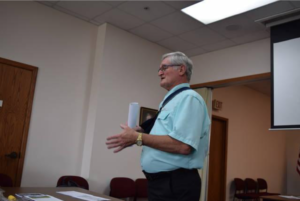Link to original article: http://www.amestrib.com/news/20180823/anti-dapl-protestors-to-march-through-story-boone-counties-next-month
Covered by Ames Tribune, Ames, Iowa, August 23, 2018
Excerpt:
By Dan Mika, Staff Writer

Keith Puntenney. Photo by Dan Mika of Ames Tribune
Climate activists announced a march from Des Moines to Fort Dodge next month to protest the Dakota Access Pipeline at Erickson Public Library Thursday morning.
The weeklong march, organized by anti-Dakota Access activist group Bold Iowa, is scheduled to begin on Sept. 1 outside the Iowa Utilities Board (IUB) office and will pass through Ankeny, Huxley, Ames and Boone to end Sept. 8 in Fort Dodge.
The Dakota Access Pipeline spans more than 1,100 miles, connecting the Bakken oil fields in northwestern North Dakota to an oil terminal in southern Illinois. It crosses through South Dakota and Iowa, including Boone and Story counties.
It has been heavily opposed by environmentalists who argue the pipeline will inevitably break and spill oil into the environment and local waterways.
Keith Puntenney, a Boone-area farmer, said installing the pipes on farmland also compacts soil and brings underlying clay higher to the surface. He said corn and soybean roots can grow into areas where there’s as much as 300 pounds per square inch (psi) in the soil. The compaction makes it harder for the crops to reach further into the soil and access more water and nutrients.
“We’ve been in five different counties on different landowner’s properties measuring the pressure along the right-of-way,” he said. ”…We can’t get it below an inch. It’s that compacted. At an inch, we get 300 psi.”
Indian American tribes also opposed the pipeline, saying it could damage wildlife habitats and encroach on their sacred lands.
The marchers are trying to rally support for a lawsuit made by landowners alleging the IUB improperly granted eminent domain for their property to Dakota Access’ parent company.
The group also led a march last April to protest the pipeline and climate change in general. In a documentary the group showed at the meeting, it claims people harassed and threatened the group as members walked near highways.
Bold Iowa head Ed Fallon said the majority of that harassment came due to anti-Indian American bias that manifested during the Standing Rock protests.
He said the group is coordinating with law enforcement agencies on the route to prepare ahead of time and doesn’t expect the same level of harassment for its upcoming march.
“Honestly, we were lucky nobody was killed or injured,” he said. “They were coming as close to us as they could, flipping us off, yelling at us, gunshots, driving around our camp at night, we were worried, and we’re not going to take any chances.”
The Iowa Supreme Court will hear arguments for that case Sept. 12, and an opinion will likely be handed down early next year.
Wally Taylor, a Cedar Rapids attorney representing the Sierra Club of Iowa in the suit, said the IUN erred in granting eminent domain to the pipeline’s owners because the oil being transported through the pipeline isn’t going into pumps or refineries in the state and doesn’t directly provide a benefit to Iowa residents.
“We think even if the utilities board gave a permit, the landowners still have a claim that the eminent domain should not have been granted,” he said.
When asked how confident they are in winning their case at the Iowa Supreme Court, Putenney said it could go either way, but he feels fairly confident that anti-Dakota Access groups will win.
He also said Susan Christensen, a district court judge from rural Shelby County who joins the Supreme Court bench next month, knows enough about agriculture to understand how the pipeline could hurt farmers economically.
“We’re on a knifeblade, it could go either way,” he said. “But the issues have been well briefed, well documented in the 3,500 pages of testimony.”
